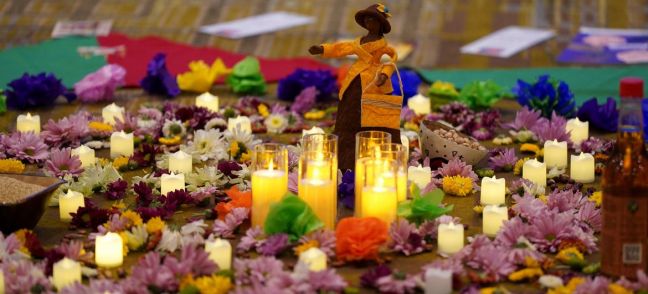The agency has also served some 500,000 hot meals to over 76,000 internally displaced persons in 57 sites in the greater Port-au-Prince metropolitan area.
Aid partners have also delivered nearly four million litres of drinking water to 29 displacement sites benefiting more than 60,000 people, UN Spokesperson Stéphane Dujarric told reporters at UN Headquarters in New York.
Gender-based violence
He added that UN children’s agency UNICEF’s response to a proliferation of gender-based violence has reached over 4,500 people, including psychosocial support. This includes passing on information about risks and services to combat gender-based violence in communities.
The UN sexual and reproductive agency (UNFPA) continues to provide services through two hotlines – one for psychological support and the other dealing with referrals and case documentation.
‘Unrelenting cycle of strikes and counterstrikes’ in Lebanon must end
Marking six months of escalating exchanges of fire across the Blue Line that marks the frontier between south Lebanon and northern Israel, two top UN officials in the country have issued an urgent appeal to all sides to recommit to ending hostilities, in line with Security Council resolution 1701.
In a joint statement on Monday, the Special Coordinator for Lebanon, Joanna Wronecka, and the Head of the Interim Force in Lebanon (UNIFIL), Lt. Gen. Aroldo Lázaro, said combatants needed to use all means available to avoid further escalation, while there is still space for diplomacy.
Dozens of civilians have tragically lost their lives while many more have lost homes and livelihoods, they added.
Suffering has gone on too long
“The unrelenting cycle of strikes and counterstrikes in breach of the cessation of hostilities constitute the most serious violation of Security Council resolution 1701 since its adoption in 2006,” the statement continued, referring to the last major conflict involving Israeli forces and Hezbollah militants.
“The violence and suffering has gone on too long. It must stop,” they declared.
Both officials underscored the importance of focusing anew “on the overarching objective of a permanent ceasefire”, saying the UN stands ready to support such efforts.
“A political process” anchored in the resolution “is now more crucial than ever to address the root causes of the conflict and ensure long-term stability”.
UNEP welcomes imminent release of conservationists from Iranian prison
The United Nations Environment Programme (UNEP) said on Monday it welcomed the impending release of four conservationists imprisoned in Iran, including former UNEP colleague, Niloufar Bayani.
According to the announcement from Tehran, Ms. Bayani will be freed along with Taher Ghadirian, Houman Jokar and Sepideh Kashani.
“UNEP looks forward to their effective release in the coming days,” the agency said.
Ms. Bayani and seven environmental conservationists were imprisoned in February 2018 and subsequently sentenced to lengthy jail terms.
Cheetah conservation
Between 2012 and 2017, Ms. Bayani worked as a consultant based out of UNEP’s Geneva office, returning to her home country to work on efforts to conserve the Persian or Asian cheetah, one of the most endangered large cat species in the world.
She was arrested in 2018 along with other internationally recognised experts in the field of nature conservation who have all dedicated their lives to conserving Iran’s wildlife, UNEP said.
“Over the past six years, we at UNEP have consistently called for the release of Ms. Bayani and the other conservationists,” the statement continued.
“As our natural world faces grave threats and the world reels from the impact of climate change, nature and biodiversity loss, desertification and dust storms and pollution and waste, environmental conservationists are critical allies in protecting the human right to a clean, healthy and sustainable environment. They are essential to building a sustainable world for current and future generations.”
Healthcare and education ‘inaccessible’ for displaced
Only one in two countries offer guaranteed healthcare and educational access to all migrants, UN migration experts said on Monday.
In a new report into migrants’ rights and opportunities, the International Organization for Migration (IOM) found that only 18 per cent of European countries provided access to healthcare and just 27 per cent offered free schooling.
That’s well below the 70 per cent of countries offering medical coverage in the Americas, where primary and secondary education is available in 58 per cent of the region’s States.
Although the constitutions of many countries prohibit any discrimination based on nationality, race or place of birth, guaranteed access for migrants to health and education is rarely specified in other legislation, although IOM pointed out that The Gambia and Portugal have done so since 2008 and 2020, respectively.
Explicit guarantees
All countries should explicitly guarantee essential services for all migrants, IOM said, just as Brazil did in 2020, “for migrant children and adolescents, refugees, stateless people and asylum-seekers” wanting to go to school.
Portugal in 2019 also amended health laws to include “foreign permanent…and temporary residents, stateless persons, applicants for international protection and migrants”.
IOM’s findings came from surveying 100 countries, including 37 from Africa, 27 from the Americas, 25 from Asia and the Pacific and 11 from Europe.

















